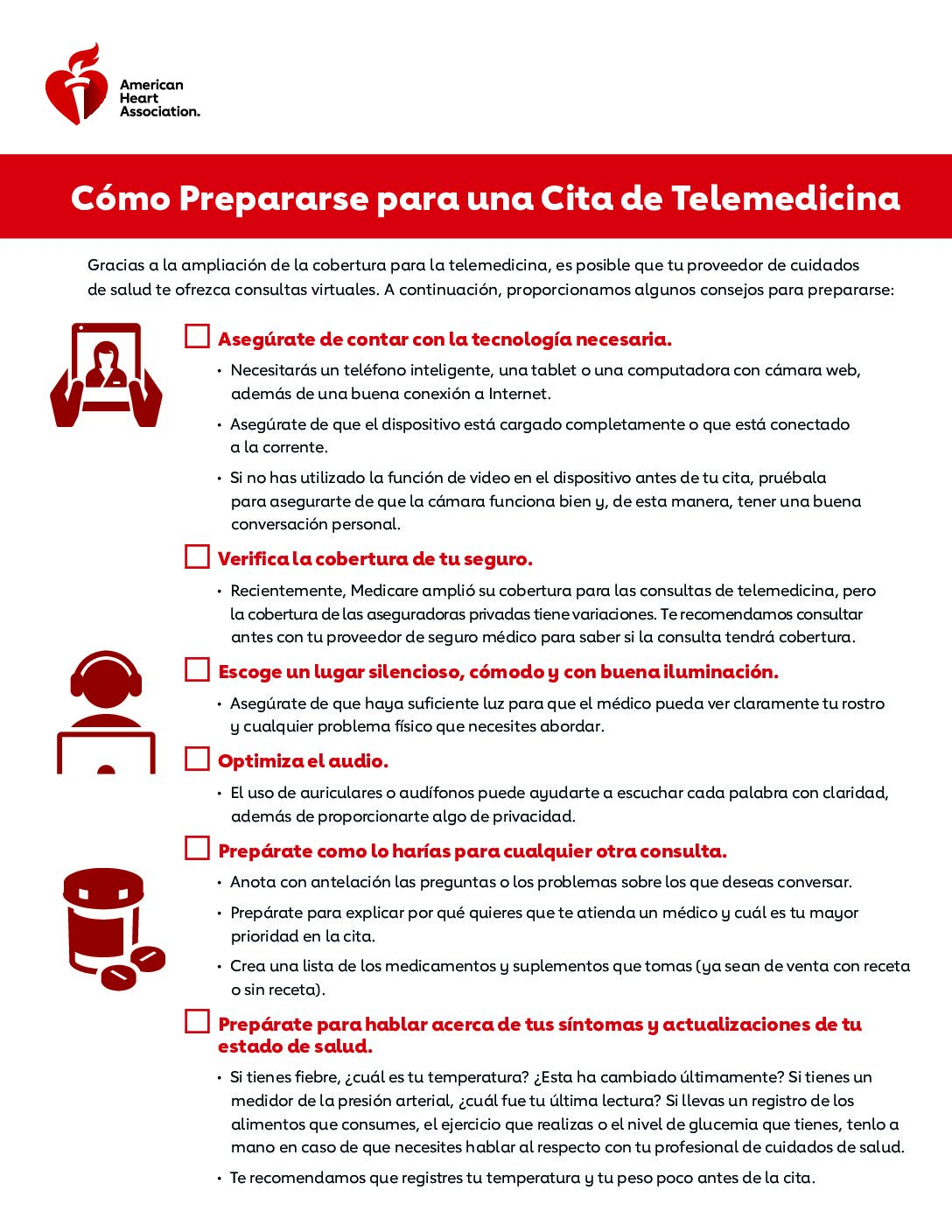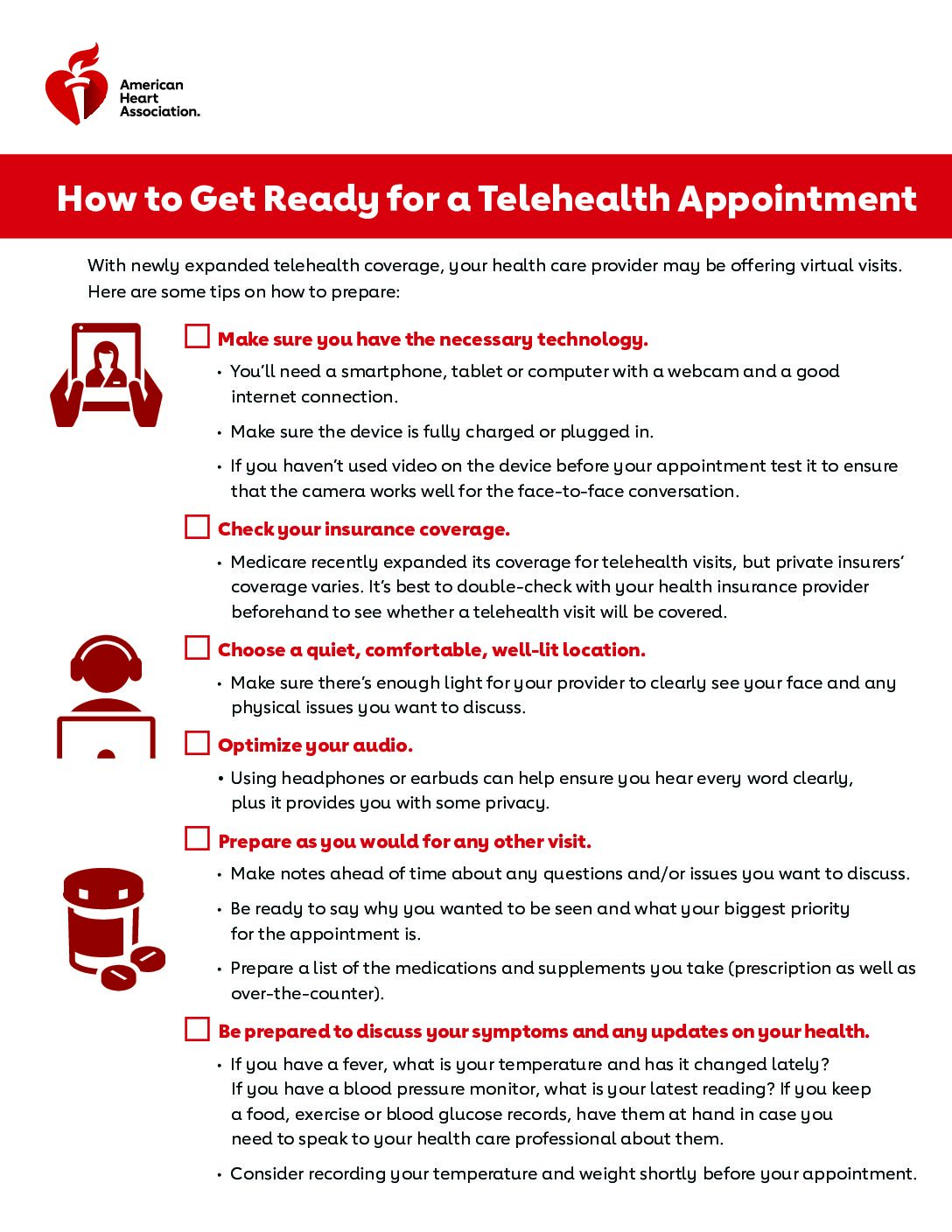Flu Season Message
How to Get Ready for a Telehealth Appointment in Spanish

Gracias a la ampliación de la cobertura para la telemedicina, es posible que tu proveedor de cuidados de salud te ofrezca consultas virtuales.
Available in English
How to Get Ready for a Telehealth Appointment

With newly expanded telehealth coverage, your health care provider may be offering virtual visits.
Available in Spanish
COVID-19 Patient Guide

What You Need to Know. If you have diabetes, heart disease, stroke, or underlying health conditions, you are at higher risk from COVID-19. With preparation you can manage your risk and stay healthy.
COVID-19 Vaccine: Protect Your Health
As someone with type 2 diabetes, you may already know the bad news: type 2 diabetes, especially if it’s not well managed, increases your chance for severe complications if you get COVID-19.
Now, the really, really (really!) good news we’ve waited for, we have a safe and effective vaccine for COVID-19. Did you hear that? A time when you can hug loved ones and avoid mentally measuring six feet from strangers is in sight! We’re so close to this future now that we have a proven way to help prevent this unpredictable and devastating virus that has taken so many lives and upturned millions of others.
What do I need to do?
You’ve already done so much. You’ve been diligent about managing your diabetes. You’ve been following the COVID-19 prevention playbook: Wear a mask! Wash your hands! Avoid crowds! Now it’s time to add one more, get the vaccine when it’s available to you. Everyone will still need to stick with the COVID-19 prevention playbook and keep conditions like diabetes and high blood pressure well managed to beat the virus, but you can think of getting the vaccine as your not-so-secret weapon.
Does it work?
The medical experts at the American Heart Association® (AHA) and the American Diabetes Association® (ADA) agree with scientists around the world that the COVID-19 vaccine is the most powerful tool we have to protect ourselves and our loved ones from its potential severe complications. This is the number one thing that will get us back to the life we miss.
Is it safe?
Yes, the COVID-19 vaccine is safe. Each available vaccine has gone through rigorous testing and been approved by the U.S. Food and Drug Administration (FDA). It’s safe for people of color, people with diabetes, people with a history of heart disease or stroke, and other underlying health issues such as chronic kidney disease, all of whom were part of the trials. Of course, if you have questions that pertain to a unique situation, contact your doctor’s office now to ask if you should and when you’re able to get it.
With all that’s changed over the last year, one thing has remained the same—at both the AHA and the ADA, your health is our number one priority and that one thing drives everything we do.
Flu: There’s a Vaccine for That
How the Flu Impacts People with Diabetes and Heart Disease
People with diabetes or heart disease have a much higher risk of serious flu-related complications compared to others, so it is important to get your flu shot every year.
Prevention Is the First Step—Get Your Flu Shot
Among the hundreds of thousands of people sent to the hospital during last year’s flu season, nearly one in three had diabetes and nearly one in two had heart disease. Studies show that flu shots reduce hospitalizations among people with diabetes by 79%.
Flu season typically begins in October each year and ends in early to mid-spring. Every person over six months of age, with a few exceptions, should get a flu vaccine every year before the end of October.
The Flu and Diabetes
Problems from the flu are more common for people with diabetes because diabetes impacts the immune system’s ability to fight infections.
Some flu complications are serious and can lead to a visit to the hospital and even death. Common problems from the flu include pneumonia, bronchitis, sinus infections and ear infections. It could also affect chronic medical conditions, such as congestive heart failure and asthma.
The flu can also make managing diabetes more difficult. As with other illnesses, having the flu can affect your ability to manage your blood glucose (blood sugar) and can lead to high or low blood glucose levels. Treatments for the flu and dehydration from not drinking enough liquid can raise blood glucose. Sometimes, people with the flu have trouble eating, which can cause their blood glucose levels to drop dangerously low. In turn, it’s important for people with diabetes to get a flu shot to lower their risk and pay particular attention if they have any flu-like symptoms.
The Flu and Heart Disease
People with heart disease and stroke also have a higher risk of developing serious complications from the flu. The risk of having a heart attack is six times higher for adults over 35 during the week of a flu diagnosis because flu-related problems can put stress on the heart.
Pneumonia, a flu-related complication, limits the amount of oxygen the lungs can pass into the blood. This puts additional strain on the heart. The heart also has to work harder to supply the lungs with blood during a pneumonia infection.
Which Type of Flu Vaccine Should I Get?
There are two main ways flu vaccines are given—injections (the flu shot) and nasal (nose) sprays. Experts recommend the flu shot for people with diabetes and/or cardiovascular disease.
The safety of nasal spray vaccines for people with these conditions is unknown. People 65 years and older should not receive a nasal spray vaccine. Instead, the Centers for Disease Control and Prevention (CDC) as well as the Advisory Committee on Immunization Practices (ACIP) recommend a higher dose of the flu shot vaccine over a standard dose. This is based on recent studies suggesting a higher dose vaccine is potentially more effective for this age group. Ask your health care provider if you have questions about which flu vaccine is right for you.
Flu Vaccinations During COVID-19
Flu vaccines are important for everyone, every year, but getting a flu shot is even more important during times of COVID-19 to keep you as healthy as possible and to help hospitals manage the increased number of people they’re seeing.
Almost all primary care physicians provide flu shots in their offices, and many pharmacies offer flu shots too. Medical providers are working hard to keep visitors safe during COVID-19 .
Most clinics require masks. You may be asked COVID-19 screening questions, like if you’ve been in close contact with people who have tested positive. Exam rooms and commonly used surfaces in clinics are carefully disinfected between visitors.
Vaccines Are Your Best Protection
Getting a flu shot reduces your risk of becoming sick or having serious problems, this is very important for people with diabetes or heart disease. Schedule your flu shot today to make sure you are protected this season.
Coordinating Your Care, Even When You are Sick at Home
For those with diabetes or those supporting loved ones with diabetes, it’s important to be on the lookout for changes in health status. You don’t have to manage risks and your treatment plan alone. Working with your diabetes care team can help you build (and stick with) the best plan for your whole body. And even if you are sick at home, a check in visit with your care team can help to keep you on track.

Who’s Who in a Diabetes Care Team?
Ready to build your well-rounded care team? Start by knowing that you are the most important member of your diabetes care team. Take an active role in decision making and be sure to let your team know what your goals are.
Next, think about each doctor and specialist you currently see. Is there anyone missing you need to see so you can best manage your symptoms and risks?
Core Team:
- Primary Care Provider (PCP): Who you typically see for routine medical care, including regular care for high blood pressure, high cholesterol, diabetes, and illness.
- Certified Diabetes Care and Education Specialist (CDCES): Trained to engage people with diabetes to care for their body. They often provide diabetes self-management education and support (DSMES) services.
- Registered Dietitian: A nutrition expert who can help you develop an eating pattern that will support healthy blood glucose (blood sugar), cholesterol, and blood pressure.
Additional Specialist Support:
- Endocrinologist: Treats conditions of the endocrine system. Endocrinologists specialize in helping patients gain control of diabetes and other hormone-related diseases.
- Cardiologist: Treats cardiovascular conditions, including those related to or caused by diabetes. They may adjust your medications and plan based on your heart and stroke risk.
- Nephrologist: Treats conditions related to your kidneys, like kidney disease. They may adjust medications to protect your kidneys and based on your heart and stroke risk.
- Optometrist: Some diabetes-related eye diseases have no signs or symptoms until they are too obvious to ignore, but getting a comprehensive dilated eye exam every year can catch conditions early before permanent damage is done. An optometrist can find and treat certain eye conditions and diseases. They can also prescribe glasses and contact lenses.
- Ophthalmologist: Can also perform comprehensive dilated eye exams. Finds, diagnoses, and treats all eye diseases, including severe eye problems. They can also prescribe glasses and contact lenses.
- Podiatrist: As a person with diabetes a podiatrist helps you keep your feet and legs healthy by looking for nerve damage and problems caused by diabetes, such as poor circulation.
- Pharmacist: Fills your prescriptions but can also help you monitor your blood glucose, offer education, identify medicine-related problems, and more.
- Dentist: Takes care of your teeth with regular care like cleanings which can lower your A1C and reduce your risk of gum disease (which is higher for diabetes patients).
- Mental Health Professional: Can help you deal with the daily challenges and emotional weight of living with diabetes. This could be a psychiatrist, social worker, counselor, psychologist or therapist.
- Fitness Professional: Helps you build an exercise routine that is safe for you. This can be an exercise physiologist, personal trainer, or physical therapist. Work with someone who understands diabetes so you can be sure your blood glucose is taken into consideration.
Why a Cardiologist is Important
A cardiologist can assess your risk for heart disease and stroke and help you with a plan to protect your heart from possible complications of diabetes. If you have heart disease and you have not spoken with a cardiologist yet, ask your primary care doctor for a referral – they probably have someone they work with regularly.
Here are some starter questions to take to your appointment:
- What are my personal risk factors for heart disease or stroke?
- Which risk factors can I control?
- What foods should I eat? What should I avoid?
- Can you review my list of current medications?
- How often should I have my blood pressure and cholesterol checked?
- What else should I monitor?
If You Need Help: Getting Started
DSMES services can help you learn how to manage diabetes. A certified diabetes care and education specialist (CDCES) can coach you and give you tools to navigate an illness and support your treatment plan. Ask your primary care physician for a referral at your next appointment. Many DSMES services now offer telehealth options. To find a DSMES service near you, check out the DSMES locator.
When it comes to diabetes, your care team can go a long way toward helping you keep your whole body, including your heart, as healthy as can be. Keep regular appointments with all your specialists to lower your overall risks of diabetes-related complications.
Learn more and receive emails from Know Diabetes by Heart at www.knowdiabetesbyheart.org.
For More Information
Managing Mental Health During COVID-19
Tuesday, May 12, 2020
Watch the Video
There is a lot of uncertainty during the COVID-19 pandemic, which may lead to added stress on top of managing your diabetes. Our guest expert will talk about ways to cope and engage with your support systems when you may be physically distanced from friends and family.
Managing Diabetes and Your Risk For Heart Disease: See a Diabetes Educator

With all the changes and stress that can come up in life you may feel overwhelmed with managing diabetes. But diabetes self-management education and support (DSMES) services can keep you on track.
DSMES helps you develop a realistic diabetes plan, solve problems and give you confidence to manage your diabetes. It may also help you:
- Feel empowered.
- Feel less stressed about diabetes.
- Reach better A1C levels.
- Manage blood pressure and cholesterol levels.
- Eat healthy and engage in more physical activities.
- Avoid serious health problems in the future such as kidney disease, heart disease or stroke.
If you can’t attend in person or need more flexibility, many practices offer telehealth diabetes education with recent guidance from the Centers of Medicare and Medicaid. The practices can set up one-on-one visits while you’re at home over the phone or on your computer. Ask your insurer about your benefits related to telehealth diabetes education.
To learn more about how telehealth can help you manage your diabetes, watch the Cardiovascular Care & Telemedicine video.
If telehealth visits aren’t an option from your primary care or endocrinologist office, recognized national programs from the American Diabetes Association® (ADA) can provide virtual DSMES services.
Even if you’ve been managing diabetes for some time, the ADA recommends annual education to stay on track with your plan. So, ask your doctor for a referral to DSMES services.
Discover more information on DSMES services, find a program near you and
If telehealth visits aren’t an option from your primary care or endocrinologist office, ADA Recognized National programs can provide virtual diabetes self-management education and support.
Even if you’ve been managing diabetes for some time, the American Diabetes Association recommends annual education to stay on track with your plan. So, ask your doctor for a referral to DSMES.




